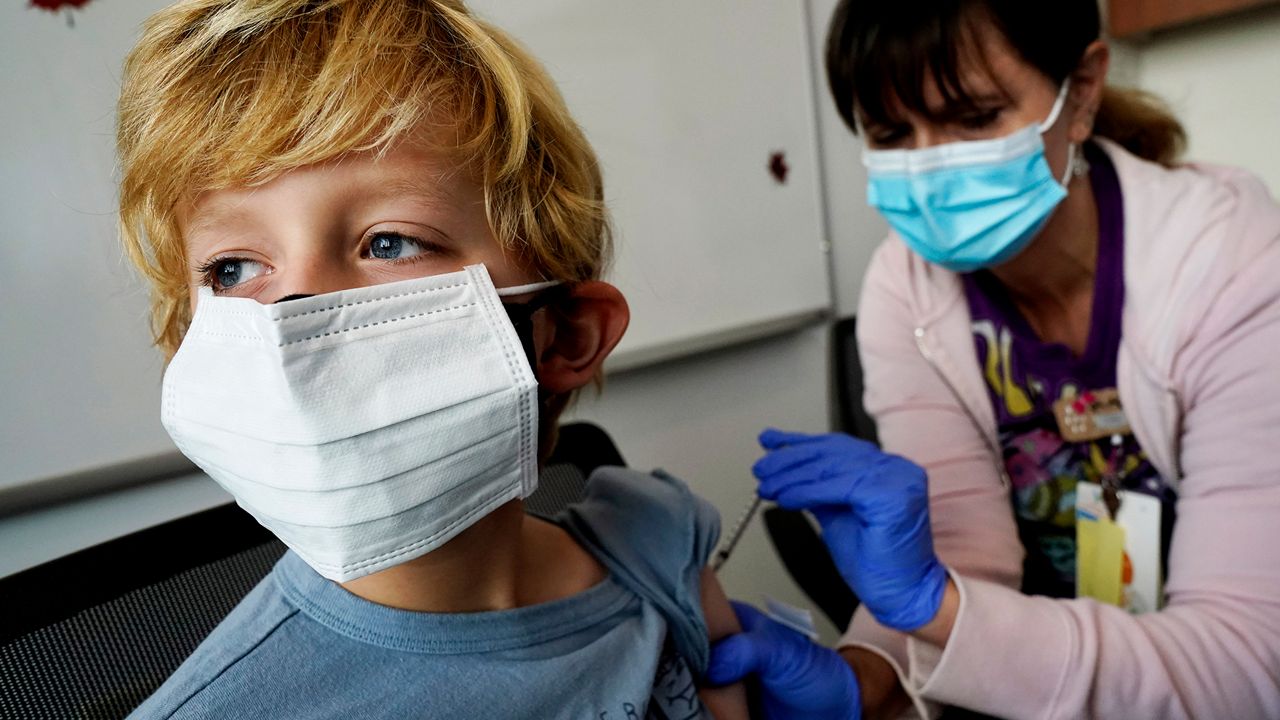COLUMBUS, Ohio — With elementary school age children having only been eligible for the Pfizer vaccine for a month, most companies requiring patrons to be vaccinated have not yet indicated plans to mandate proof of vaccination for young children.
What You Need To Know
- Some entertainment venues are requiring the vaccine or a negative test
- Children have not yet been subject to many vaccine requirements in Ohio
- The Ohio House passed a bill that would block "vaccine passports"
The Columbus Association for the Performing Arts has been requiring vaccination, or a recent test for everyone 12 and older since early October. At the seven venues under the policy, kids 11 and younger are generally exempt.
Asked if the policy will change as more young kids get vaccinated, spokesperson Roland Copley said the current rules will remain in place for now.
“At this time, there are no plans to make changes to CAPA's current health screening requirements,” Copley said.
In northeast Ohio, more than a dozen entertainment venues have a joint policy requiring vaccination, or a recent negative test. Some of the venues that are family-friendly are still exempting unvaccinated kids from needing a test.
Concert promoter Live Nation and entertainment presenter AEG are requiring children to be vaccinated, or have proof of a recent negative test to enter venues. The two companies, which have presences in the Columbus, Cincinnati and Cleveland areas, do not exempt children from the testing requirement at events under their umbrellas.
Music and Event Management, Inc., an entertainment promoter in southwest Ohio, is also requiring the vaccine, or a negative COVID-19 test for all children and adults.
Legislation that was passed by the Ohio House last month would prohibit “vaccine passports,” and it would significantly weaken public school vaccine requirements for COVID-19 by carving out a broad list of exemptions.
During an Ohio Senate committee hearing Tuesday, Rep. Al Cutrona, R-Canfield, said the legislation will protect kids from discrimination.
“We cannot forget about our children. We cannot have them discriminated against just based upon their vaccination status. I mean, we're seeing this today that these children are performing worse now during this COVID crisis that we're facing than ever before. We don't need to discriminate against them and prevent their ability to learn,” he said.
For the most part, vaccine requirements for kids in Ohio have been few and far between. While many Ohio colleges require COVID-19 vaccination for students, those mandates have yet to trickle down to younger students.
A vaccine mandate has been considered for students in Cincinnati Public Schools, but a survey of parents found that mandating the vaccine is unpopular. Of 6,083 respondents, 66% were opposed to the idea, officials said at a Nov. 15 meeting.
The Cincinnati Board of Education's Policy and Equity Committee was tasked with evaluating a vaccine mandate for students, determining that a requirement would bring health and safety benefits, but could come at the cost of significant pushback from families, some of whom may choose to leave the district if the vaccine were to become a requirement.
One member of the committee said he supports vaccination for kids, but worries a mandate for students may not be the right move in light of the survey results.
“It was pretty clear from those results that this is not something that even close to a majority of parents are supporting,” he said. “I do have great pause about requiring something that such a clear majority of parents, at least based on that information, don't support.”
A national survey by the Kaiser Family Foundation found that 53% of parents of children aged 5 to 11 are worried their child might be required to get the vaccine even if they don’t want them to.
Vaccination rates for Ohio’s youth are well below the 68.5% vaccination rate the state reports for adults 18 and older. Among children aged 12 to 17, 44.8% have received at least one vaccine dose, and among the 5 to 11 age group, 14.25% have started the vaccination process.
Reynaldo Cordoba, 47, who lives outside of Columbus, has two children in school — a 17-year-old daughter who is vaccinated and a 14-year-old son who is still on the fence because he had COVID-19, Cordoba said.
Even though his family is split, Cordoba said he would support vaccine requirements for in-person learning down the road, perhaps for next year. He said vaccinating kids could help restore normalcy, and he said the side effects of the vaccination appear to be minimal.
“When they’re babies, we give our kids all the shots, and I would say we don’t really question that,” Cordoba said. “It seems like the pandemic has brought out every expert, so I think some of it is politically driven."
Outside of Ohio, some school districts are moving forward with vaccine requirements for students. For the Los Angeles Unified School District, the second largest in the country, students 12 and older had a Nov. 21 deadline to start the vaccination process.
Officials in California have indicated plans for a statewide vaccine requirement for students after a vaccine is fully approved for younger kids. New York City’s incoming mayor also supports vaccine requirements for students upon full authorization.
The Pfizer-BioNTech vaccine has been fully approved for individuals 16 and older, while children aged 5 to 15 are eligible under emergency use authorization. On Nov. 22, Pfizer announced additional vaccine data for the 12-15 age group and said it would submit for full regulatory approval for the age group.
Nationally, most vaccine mandates apply to older children who have been eligible for months, but there are some exceptions. In San Francisco, officials have announced that children aged 5 to 11 will soon be required to show proof of vaccination for indoor dining and other activities. Disney Cruise Line has also announced that passengers 5 and older will be required to have proof of vaccination.



